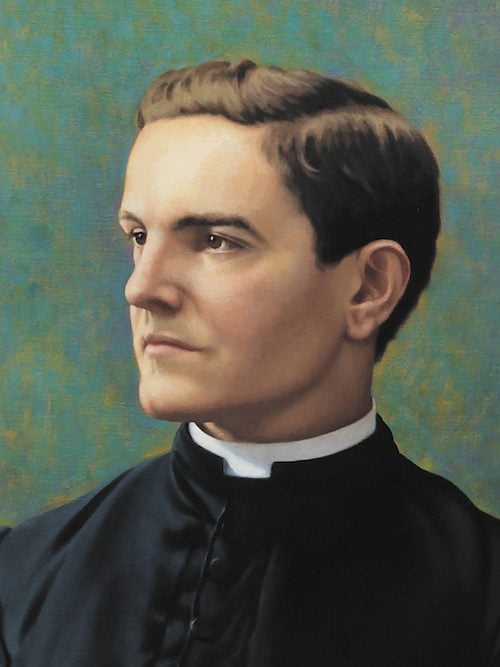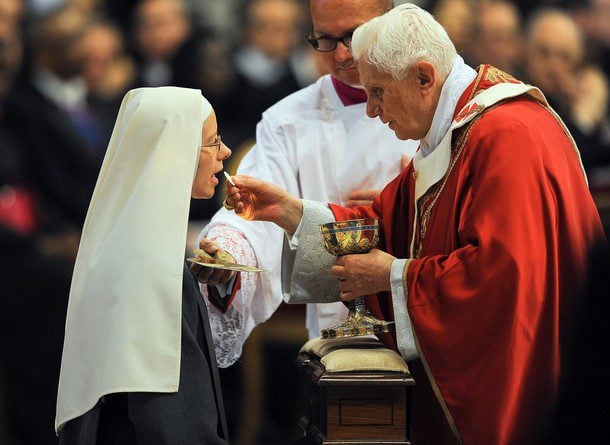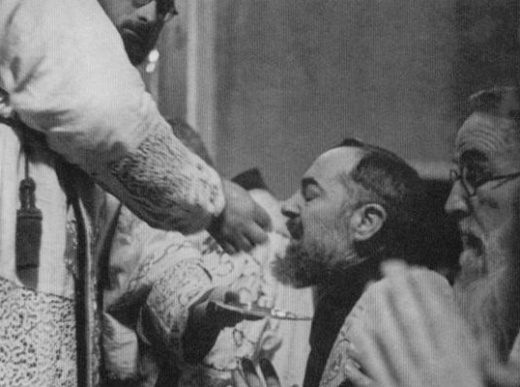Works regarding the reception of Communion usually contain an unsettling air about them, if only because (a) Catholics tend to be dicks over these matters and (b) they point to a difference between Catholics at the precisely the moment when Catholics claim all accidental differences cease. It is the Church’s absurdly bold declaration that all become one in Christ. It follows that a notable difference in the reception of that very same Christ (in the Holy Eucharist) could be an opportunity for scandal.
How one in spirit are we, a man may be tempted to ask, if we are so diverse in expression and in body, some kneeling, some standing, some receiving on the tongue, and others on the hand? Do the actions of the body not arise from the spirit?
If a visitor entered a home and some stood to welcome him, others knelt when he crossed the doorframe, and still others approached him and firmly shook his hand, one thing would be certain: They all have different relationships to the visitor. They are not in communion in regards to him. Could the same not be said of Catholics’ diverse reactions to their Sunday Visitor, Jesus Christ?
The complaint is easily brushed away. Catholics are not told to respond to the innate calling of their hearts when they go to receive Communion. A man may believe his personal relationship with Jesus Christ mandates he receive Communion lying down — but he is not allowed to do so. Rather the Church, understanding the reality of the Eucharist (and the reality of the Christian in relation to the Eucharist) has set down three approved methods for the reception of Communion. They are — while standing — to receive on the hand or on the tongue, and — while kneeling — to receive on the tongue.
These three norms have been found by the Church to sufficiently express the proper reaction of man to the Eucharist. Thus we are united in our reception even if we differ in our posture, for we are united in the wisdom of the Church, and in obedience to Her. We follow her orders, which order us to the same end.
To apply what I’m saying to my previous example, it is as if the same visitor were coming to the house, and so the mother of the house took her children aside and said, “Children, we’re expecting a very distinguished guest. When he arrives you may embrace him, shake his hand, or bow politely. Nothing else, for he merits more than a wave, or a fist-bump, or whatever innate reaction you have to his presence. Understand?” The children, upon greeting the guest in these three ways, are united in spirit, as they are united in the authority of their mother who has determined their proper posture. The man who understands this cannot complain of a disunity among them.
However, as a child going to receive Communion, I choose to receive on the tongue. I would like to explain why. It is not because it is holy. It is not because it is traditional — Lord save me from ever placing value on a thing because it is old. It is because receiving the Eucharist on the tongue expresses in the body a fundamental truth about the Eucharist: That it comes from God.
it is holy. It is not because it is traditional — Lord save me from ever placing value on a thing because it is old. It is because receiving the Eucharist on the tongue expresses in the body a fundamental truth about the Eucharist: That it comes from God.
Whereas the world is oppressed by all manner of nitpicking authorities without recognizing it, it is the defining characteristic of the Christian in this age that he is sweetly oppressed by one Authority, and that he damn well knows it. For it is no freedom to claim freedom from authority, it only means swearing fealty to the dogma of never swearing fealty, an insane task made all the more difficult by the fact that we will always swear fealty to authorities. The authority of Truth — for instance — is unavoidable, and the authority of Goodness is obeyed even by the liberated modern, for in saying “it is good to break away from authority”, he assents to the authoritative dogma that man should do that which is Good.
The Catholic simply professes that all this inevitable authority comes from the sovereign authority of God (for Beauty, Truth and Goodness are but names for God) and that the many are therefore One. Thus he prays with Marcus Mumford for “a tethered mind freed from the lies,” for that authority which — when obeyed — frees man from all false authority, that of sin, the passions, unjust law, fashions, fads, sociology, scientism, and all the rest.
Now if there is authority, it follows that some will have it and others will not. In a country of Kings, no one is King, and if everyone was endowed with parental authority, then the six-year old’s daydream would be realized, and there would be no Parents.
It is the Catholic belief that God became man and granted certain men supernatural authority. Certain men, because authority, by its nature, can only be contained by certain people, or it would cease to be authority.
“Truly I tell you, whatever you bind on earth will be bound in heaven, and whatever you loose on earth will be loosed in heaven.” (Matthew 18:18)
Jesus says this to his apostles. If the authority to act on behalf of Heaven is not limited to certain men — the apostles and their descendants — then it is authority for every Christian. If it is for every Christian, why is it unacceptable for me, as a Christian, to inform you that what I loose on Earth is loosed in Heaven, and that we may now oppress the poor?
“If you forgive anyone his sins, they are forgiven; if you do not forgive them, they are not forgiven.” (John 20:23)
Jesus says this to his apostles. If the authority to forgive sins is not limited to certain men — the apostles and their descendants — then it is authority for every Christian. If it is for every Christian, why is it unacceptable for me, as a Christian, to forgive the sins of my friends?
 So certain men are given supernatural authority. These men are the apostles of Christ. And the greatest power they are given is to consecrate bread and wine and thereby change its substance into the body and blood of Christ. As Paul — a priest — testifies:
So certain men are given supernatural authority. These men are the apostles of Christ. And the greatest power they are given is to consecrate bread and wine and thereby change its substance into the body and blood of Christ. As Paul — a priest — testifies:
“For I received from the Lord what I also passed on to you: The Lord Jesus, on the night he was betrayed, took bread, and when he had given thanks, he broke it and said, “This is my body, which is for you; do this in remembrance of me.” In the same way, after supper he took the cup, saying, “This cup is the new covenant in my blood; do this, whenever you drink it, in remembrance of me.” For whenever you eat this bread and drink this cup, you proclaim the Lord’s death until he comes.” (Corinthians 11)
In that he is an apostle — “for this gospel I was appointed a preacher and apostle and teacher” — Paul is a priest and a bishop, a man with the authority Christ spoke of, a man who can forgive sins, bind and loose, and offer sacrifice. He passes down this holy priesthood by the laying on of hands (Acts 6:6; 13:3; 1 Timothy 4:14; 2 Timothy 1:6; Matthew 13) — “hence I remind you to rekindle the gift of God that is within you through the laying on of my hands,” he says to Timothy.
To summarize: Priests have supernatural authority, and this authority — by the unbroken tradition of the laying on of hands — is with our priests today.
Contrary to popular belief, to recognize this authority is not to bloat the ego of the priest, unless he is living unworthily of his vocation. To recognize this authority in the Priest is to give thanks and praise to Jesus Christ, who granted such marvelous power to such unmarvelous men.
Now when I unworthily receive the body of Christ, I should do so with the profound understanding that it is not by my power that I receive Him, but by the authority of God made manifest in his Church. It is by the power of Christ granted to the priest. The Eucharist is the gift of God to us, Love Himself made vulnerable to our ingestion. It is not a thing we can take or claim — it is a person we receive. Receiving on the tongue expresses this truth in the body.
As a baby bird lifts its head for food, or as an infant seeks its mother’s milk, so we open our mouths. There is no action between the administration of the Eucharist by the priest and my reception of the very same. In this posture of helpless receptivity we conform our bodies to the authority of God, and to the reality that we are dependent on his action — manifested in the Church — for our salvation. We recognize by our bodies that the Eucharist is gift, pure gift.
To receive on the hand in the modern fashion is not a bad thing, but I am affected by its sign value. The priest places the host in my hands, and I take it, lift it up to my mouth and ingest it. It’d be ridiculous to say that because of this I have received the body of Christ by my own power, and not by the power of God manifest in His Church. Nor would I ever argue that anyone believes this to be the case. But the difference in sign value is still a real difference. What we do with our bodies does influence the orientation of our intellect and spirit. Because the sign value of reception on the tongue effectively communicates to me the reality of God’s authority present in the Church, his abundant outpouring of power and dignity on sinful men, and my own unworthiness to receive him outside of his loving action, I receive Communion on the tongue.













